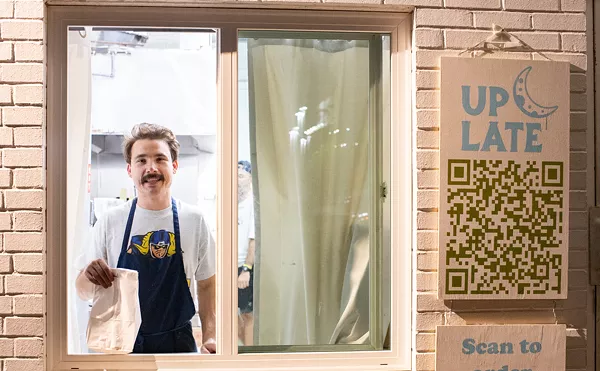Correction published 11:00 a.m. 2/17/11: The second showing of America the Beautiful takes place Wednesday, February 23, 7:30 pm. at Washington University's main campus in Lab Sciences 300, four buildings north of the Law School. Seating available for up to 300 people.
The National Eating Disorders Association has declared February 21-26 National Eating Disorders Awareness Week. It's not just about food. The organization links "extreme emotions, attitudes, and behaviors surrounding weight and food issues" to the roots of disordered eating. That's just the beginning, though. Events in St. Louis throughout the week aim to provide education about the multitude of eating disorders.A highlight of National Eating Disorders Awareness Week in St. Louis will be a screening of the 2007 documentary America the Beautiful paired with an appearance by filmmaker Darryl Roberts.
"The most exciting event is bringing in producer/director Darryl Roberts and his film America the Beautiful and offering two free, open-to-the-public screenings with panel discussions and question-and-answer [sessions] on Feb. 23," says Jennifer Kamer, of McCallum Place, an eating-disorders treatment center in Webster Groves that's sponsoring the events. The film will be shown at 4:30 and 7:30 p.m. at Barnes-Jewish College's Goldfarb School of Nursing.
Gut Check spoke with McCallum Place founder and medical director Dr. Kim McCallum about eating disorders (and food) in St. Louis.
What eating disorders are most prevalent in St. Louis? All eating disorders are prevalent in St. Louis, including bulimia nervosa, anorexia nervosa, binge eating disorder, purging disorder and eating disorder not otherwise specified (EDNOS), which is a serious eating disorder that doesn't fit into one of the "classic" diagnoses.
Has the development of "foodie" culture over -- interest in the Food Network, celebrity chefs, etc. -- affected eating-disorder statistics? It's hard to say what impact the foodie culture has had on the onset of eating disorders over the past decade. In many ways, focusing on locally grown food, organic farmers, the art of cooking, love and work put into food preparation can increase mindfulness and gratitude towards food and those who work with it, which might shift behavior away from disordered, mindless eating.
On the other hand, people with severe eating disorders may be very influenced by media, such as focus on idealized body size, dieting, etc. Additionally, messages with good intentions might be taken out of context and stimulate self-doubt: for example, driving a person who is underweight and malnourished to exercise or diet inappropriately.
What can local restaurants do to create an environment that makes dining safer for those who are overcoming eating disorders? Restaurants can offer balanced nutrient content in appropriately portioned meals. For most, ballpark calorie information would be more helpful than exact calorie counts. This would help keep the focus more on a big-picture goal of committing to a healthy eating strategy, rather than approaching food with fear, restriction and over-control.
For help with eating disorders, call NEDA's hotline at 1-800-931-2237.





